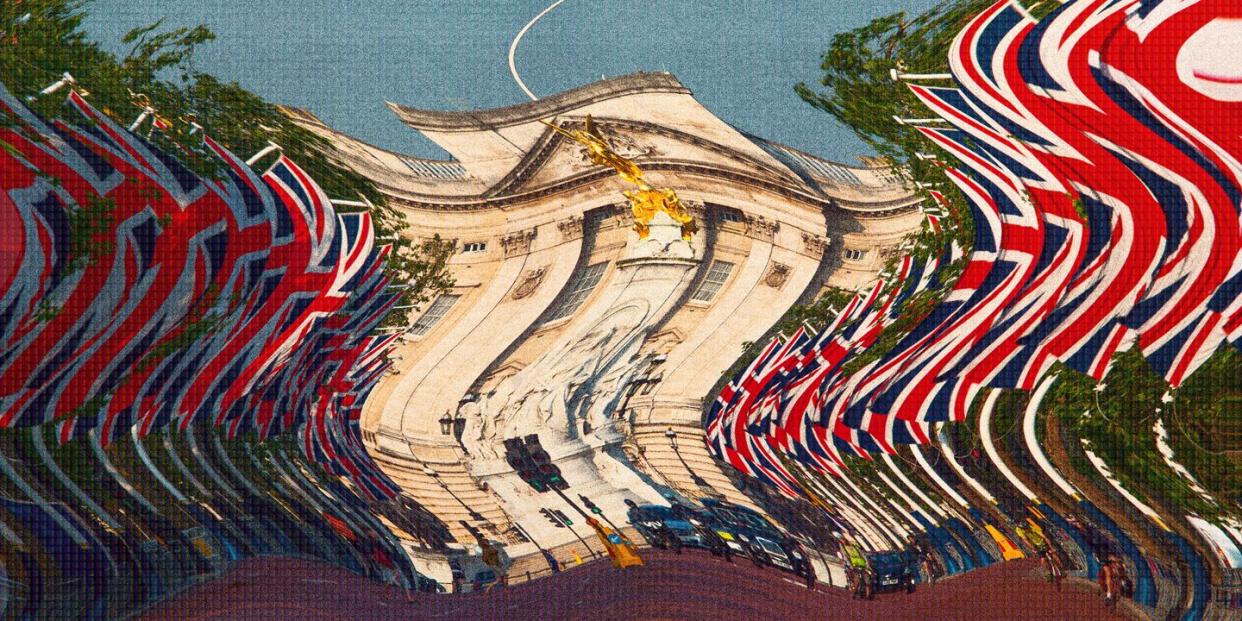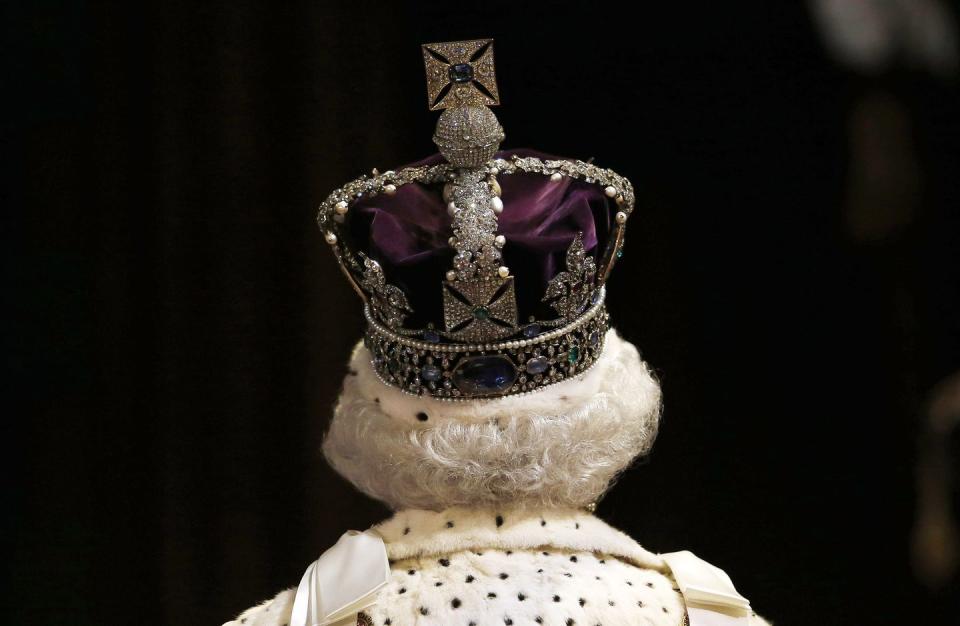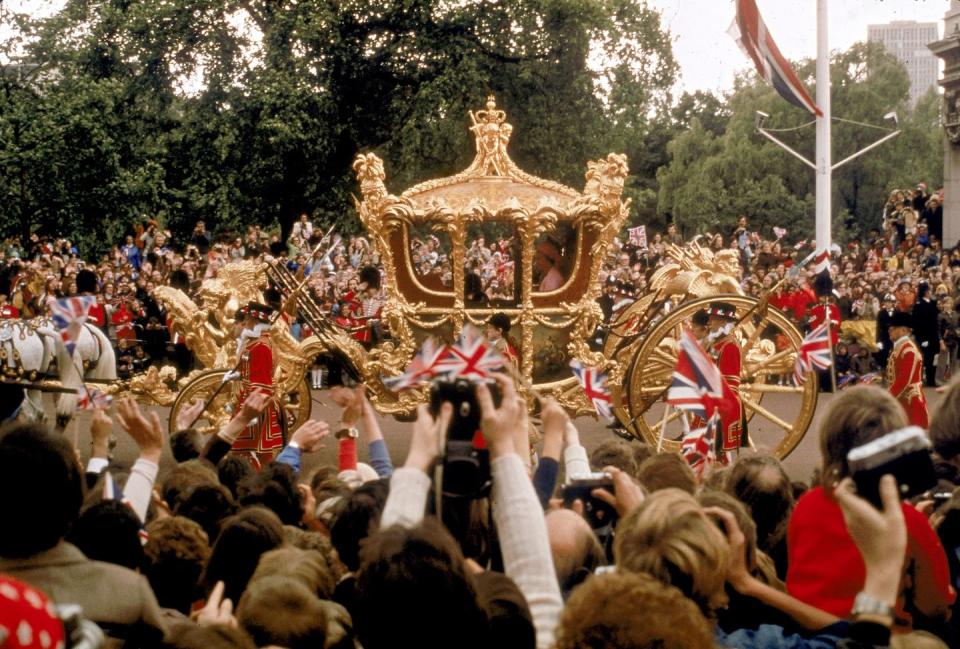Opinion: Why it's time to interrogate the meaning of monarchy in 2022

- Oops!Something went wrong.Please try again later.
- Oops!Something went wrong.Please try again later.
On Monday, the UK came to a standstill. It was one last demonstration of the latent power of Queen Elizabeth II, whose funeral prompted businesses and workplaces across the land to shutter as a mark of respect.
The passing of Elizabeth Windsor, at such a fraught time for the country and union she presided over for 70 years, resulted in predictable, widespread grief. I would imagine most of those who found themselves mourning the monarch – and perhaps this is you, reading my words now – are likely to not self-define as ‘royalists’.
They will consider their attachment to Elizabeth, and perhaps her children too, as the result of her years of ‘service’ to the country; her constant, steadying presence through the upheaval of the 20th century and into the full-blown chaos of the 21st. They won’t think themselves particularly supportive of the monarchy’s continued existence; they may even believe it doesn’t make a difference either way. After all, the UK still is – supposedly – a democracy, with an elected government and prime minister. The royals are merely symbolic. Why not just let them be?
The answer lies in what the British monarchy symbolises. There are many who are willing to interrogate this, but others have branded it ‘inappropriate’ to examine the often unpalatable truth about the institution she spent the majority of her life maintaining. Journalists from ethnic minority backgrounds have reported receiving a “torrent” of racist abuse for coverage that examined the queen’s legacy in the context of British colonialism and the role of the monarchy in the imperial mission.

But if we are serious about striving for a society that values equality, we have to confront the stark truth about British history.
Elizabeth was born in 1926, ascending to the throne in 1952. People may desperately wish to excuse her, as an individual actor, from the violence of empire, but she was nonetheless in the thick of it. Footage of a speech the 21 year-old regent-in-waiting gave in segregated South Africa has been circulating on social media; in it Elizabeth dedicates herself to the “service of the great imperial family”, her audience being the “whole Empire listening”.
The declaration was made as South Africa was on the brink of ushering in the official apartheid regime, entrenching racial segregation that had been introduced by successive British and Dutch colonial rule in the years before. Later that same year – 1947 – Britain ‘granted’ India independence after centuries of plundering the country. Britain’s exit resulted in the partition of India and Pakistan, thanks largely in part to the religious divisions British colonists had encouraged. Fifteen million people were displaced in the process and an estimated one million died.
Imperial violence hadn’t ceased by the time Elizabeth became queen. Although the official British Empire was reducing at a fast lick, struggles for independence in nations across the Global South (and in Northern Ireland) were often accompanied by widespread bloodshed, with newly liberated countries forced to grapple with legacies of colonialism that still dog them today. In the first 20 years alone of Elizabeth’s reign, the fingermarks of imperial Britain could be found everywhere including the Nigerian civil war and genocide of 1967, the brutal suppression of the Kenyan Mau Mau uprising, and the Troubles.
There may be a temptation to categorise these events as unpleasant but ancient history; Elizabeth is often presented as a ‘modernising’ monarch. But not only is the empire still live (Charles now presides over 14 Commonwealth realms as head of state, in addition to the UK), the destabilising impact of colonisation lives on everywhere from the he brutal inequality and corruption entrenched in the likes of Nigeria – the largest economy on the African continent and yet counts 112m people living in poverty –, to Pakistan, where Britain's imperial legacy has worsened the devastating impact of climate change on regions like south Punjab.
Unfortunately, the subjugation and struggles of regions and people not on the immediate doorstep (and even those who are, such as in the six counties or the descendants of those who have migrated from former colonies) can feel far away, and of less emotional import to some in Britain. It’s an uncomfortable but understandable truth. We have finite emotional resources. We spend them on the world immediately before us. So, let’s examine what we see on the domestic front.
Beyond any sentimental attachment to Elizabeth herself, who are the royals? A gaggle of people, elevated above all others due to a concept that is best explained as ‘magic blood’. The sovereign, we are told, has the ‘divine right to rule’. What does that even mean in modern, secular Britain? The sitting monarch is officially exempt from the law – and those around them are unofficially able to evade the rules that bind the rest of us (see Prince Andrew settling his sexual abuse case with a mysteriously acquired £12m and now restored to some royal duties by his brother, the new king).
The sitting monarch is officially exempt from many laws – and it seems those around them are unofficially able to evade the rules that bind the rest of us (see: Prince Andrew settling his sexual abuse case with a mysteriously acquired £12m and now restored to some royal duties. Prince Andrew denies all charges against him.)

The entire function of monarchy is to uphold a rigid system of class hierarchy and inequality. It rests on the same principles as the chattel slavery that saw millions of Africans enslaved by Britain for centuries (a trade directly invested in and expanded by successive English and British monarchs): that your blood decides your path from birth. Some are born to rule, others to serve. Is that the symbolic scaffold Britain really wants to build its future upon, as we slide further into an economic crisis that will bring hardship to all but the very wealthiest?
Examples abound of what the monarchy really stands for; food banks closed, funerals and doctor’s appointments cancelled because of the queen’s own memorial service. Some lives, this tells us, matter far more than others. Meanwhile, as residents of the UK see the value of their wages freefall in real time, and our new prime minister embraces the return of ‘trickle-down economics’, we are met with headlines about how Charles III will not be paying a penny of inheritance tax– aka wealth redistribution to the state – on the hundreds of millions he’s been left by his mother.
People wish to separate Elizabeth, the serene old woman, from the royal institution. But that’s entirely at odds with both reality and a life spent in service of the Crown. If we want to really respect Queen Elizabeth II and all she stood for, we can start by seeing the monarchy for what it really is – and having open, honest and educated conversations about the prospect of dismantling it.
You Might Also Like

